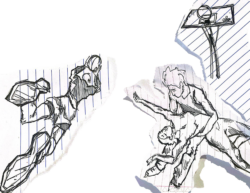After Syracuse and Pittsburgh announced they were leaving the Big East for greener football pastures in the ACC, many Hoya fans were despondent, preparing themselves for a plunge into decades of college basketball irrelevance.
To me, though, the panic that has spread throughout campus in the few days since the news broke has been even more astounding than the news itself. Perhaps it stems from the frustration of first round tournament exits, or maybe this particular realignment hits close to the heart. Regardless of its origins, this realignment is not a doomsday scenario or even the beginning of the end—the Hoyas will be just fine.
Though it is undeniable that the Big East is weaker without the Panthers and the Orange, their departure by no means makes the Big East a weak conference. In fact, the Big East will remain one of the country’s deepest and most respected basketball leagues. The exit of two perennial contenders hardly debilitates a conference whose ninth place finisher, Connecticut, was cutting down the nets in the national title game last spring.
Those worried by the ACC potentially becoming a “super-conference” need only remember how brutally awful the league has been outside of Duke and North Carolina in recent years.
Furthermore, the loss of Pitt and ‘Cuse has to be put in its proper historical context. Much of the histrionics have come from the idea that Big East prestige has suffered a crushing blow, that the conference’s diminished talent pool will only be exacerbated over the years as the remaining Big East schools struggle to match previous recruiting standards.
This argument hardly seems valid. Pitt and Syracuse only constituted a small piece of the Big East’s core. Aside from their national title in 2003, the Orange have made just one Final Four appearance in the last twenty years, while winning just three Big East titles. Pitt, meanwhile, hasn’t made a Final Four since 1941.
While these teams have carried a lot of weight in the conference over the past decade, we must be careful not to overstate their contribution to the competitive quality of the Big East. The strength of this conference lies in its remarkable depth from top to bottom—there still isn’t a conference in the country that can boast as many quality teams as the Big East.
Losing these annual matchups will certainly damage the Hoyas’ overall strength of schedule, but the program as a whole will not be harmed. Recruits will still flock to the historic and highly competitive Big East. Powerhouses from around the country will continue to solicit Big East teams to bolster their non-conference schedules.
The real danger for the Hoyas is not a weakened Big East, but rather that the Big East will dissolve or become a sub-section of one giant conference, as schools look to maximize football revenues. But even if the Big East ceases to be, Georgetown is well positioned to thrive with other basketball-focused schools. St. John’s, Villanova, DePaul, Providence, Seton Hall and Marquette are just some of the Big East schools that find themselves in the same uncomfortable position as the Hoyas, without FCS football programs but with basketball teams ready to compete at the highest level.
These schools will not allow each other to fall by the wayside and could even unite with non-Big East schools like Xavier and Butler to create a conference solely designed to compete in Division I basketball. While such a move is unprecedented, so was the exit of two of the Big East’s oldest members.
While their classic bouts with the Orange may cease, the Hoyas have actually lost very little in terms of potential and prestige. Save your worried looks and decadent sighs for the actual season when the Hoyas inevitably allow their frustrating habits to nullify their immense talent, leading to a premature tournament exit. The Hoyas have survived the dark days of Craig Esherick and inconsistencies of John Thompson III. We will survive without Pittsburgh and Syracuse and continue our legacy of basketball excellence – if that’s what you want to call it.




